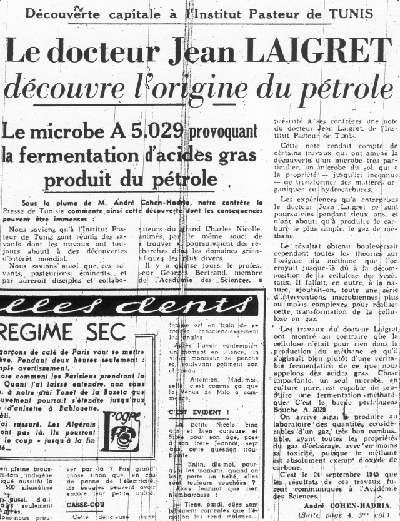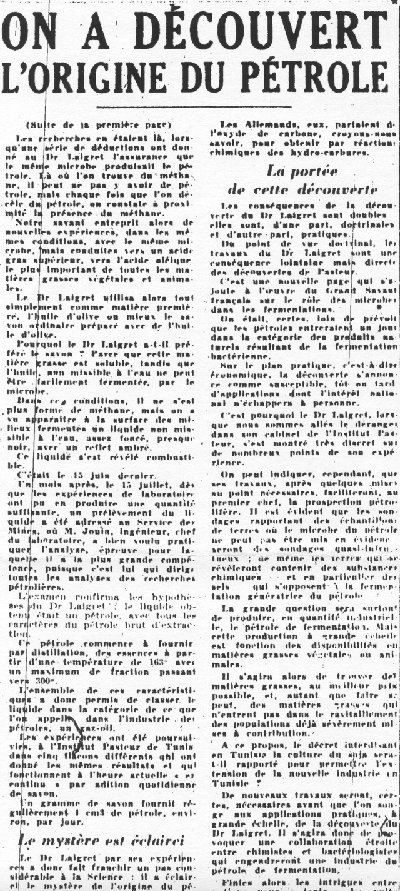Doctor Jean LAIGRET discovers the origin of oil
L'Alger Républicain of August 28, 1947, text reproduced in full. To read the original article, click on the image.

The microbe A 5029 causing the fermentation of fatty acids produces petroleum.
From the pen of Mr. André Cohen-Hadria, our colleague Press Tunisia Commenting on this discovery, the consequences can be immense.
We knew that at the Institut Pasteur in Tunis, there are scientists whose work has always resulted in discoveries of worldwide interest.
We also knew that these eminent scholars Pasteur and moreover disciples and collaborators of the great Charles Nicolle, animated by the same desire to "find", continued research in the most diverse scientific fields.
Two weeks ago, Professor Georges Bertrand, member of the Academy of Sciences, presented his colleagues with a note from Doctor Jean Laigret, from the Institut Pasteur in Tunis.
This note reported on certain works which led to the discovery of a very particular microbe, a soil microbe, which has the property - until now unknown - of transforming organic matter into hydrocarbons.
The experiments undertaken by Doctor Jean Laigret continued for two years and only resulted in the production of the simplest carbide, methane gas.
The result obtained, however, overturned all theories on the origin of methane that had until then been believed to be due to the decomposition of cellulose in plants. In addition, nature, it was added, needed a whole series of more or less complex microbial interventions to achieve this transformation of cellulose into gas.
On the contrary, the work of Dr. Laigret has shown that cellulose was not involved in the production of methane and that it was rather a real fermentation of what we call fatty acids. Importantly, a single microbe, in pure culture, is capable of producing methane fermentation. It is the bacillus perfringens strain A 5029.
It is thus possible to produce in the laboratory considerable quantities of a very good combustible gas, having all the properties of lighting gas, with less toxicity, since methane is absolutely free of carbon monoxide.
It was on September 24, 1945 that the results of this work were communicated to the Academy of Sciences.
We discovered the origin of oil

The research was there, when a series of deductions gave Dr. Laigret the assurance that the same microbe produced the oil. Where methane is found there may not be any oil, but any time oil is found, methane is found nearby.
Our scientist then undertook new experiments, under the same conditions, with the same microbe, but conducted towards a higher fatty acid, towards the most important oleic acid of all vegetable and animal fats.
Doctor Laigret then used quite simply as raw material, olive oil or better the ordinary soap prepared with olive oil.
Why did Dr Laigret prefer soap? Because this fat is soluble, while oil, immiscible with water, cannot be easily fermented by the microbe. Under these conditions, no more methane was formed, but a liquid immiscible with water, quite dark, almost black, with an amber reflection was seen to appear on the surface of the fermented media.
This liquid was found to be combustible.
It was June 13th. A month later, on July 13, as soon as the laboratory experiments were able to produce a sufficient quantity, a sample of the liquid was sent to the mining service, where Mr. Jouin, engineer, head of the laboratory, kindly carried out the analysis, test for which he has the greatest competence, since it is he who directs all the analyzes of petroleum research. The examination confirmed Dr. Laigret's hypotheses: the liquid obtained was petroleum, with all the characteristics of crude oil extraction.
This oil begins to provide by distillation, gasolines from a temperature of 163 ° with a maximum fraction passing towards 300 °.
All of these characteristics have therefore made it possible to classify the liquid in the category of what is called in the petroleum industry, a gas oil.
The experiments were continued at the Pasteur Institute in Tunis in five different flasks which gave the same results and which currently operate “continuously” by adding soap daily.
A soap gram regularly provides 1 cm3 oil, approximately, per day.
The mystery is cleared
Dr Laigret through his experiments therefore took science a considerable step forward: he clarified the mystery of the origin of petroleum. Until now, of all the hypotheses put forward on the formation of petroleum in the ground, none had proved to be satisfactory and above all none had been the subject of an experimental confirmation outline.
It is therefore shown that petroleum is the product of microbial fermentation. Just as certain microbes, yeasts for example, make alcohol, or the acetic ferment vinegar, there is a microbe, the ferment of petroleum which transforms fat into hydrocarbons.
This transformation was carried out and continues to be done in the laboratory.
Astonishing thing - and there lies one of the interests of the discovery - the fermentation that generates petroleum is rapid, as rapid as that which produces alcohol: once started after a few days, the fermentation of the soap provides in 24 hours and regularly, the quantity of crude oil corresponding to the soap introduced into the tank.
It is essential to point out, moreover, that the work of Dr Laigret has no connection with the production of synthetic oil in Germany. The Germans, as for them, started from carbon monoxide, we believe, to obtain hydro-carbides by chemical reactions.
The scope of this discovery
The consequences of Dr. Laigret's discovery are twofold; they are, on the one hand, doctrinal and on the other hand, practical. From a doctrinal point of view, the work of Dr Laigret is a distant but direct consequence of the discoveries of Pasteur.
This is a new page which is added to the work of the great French scientist on the role of microbes in fermentation.
It was certainly far from foreseeing that the oils would come a day in the category of natural products resulting from bacterial fermentation.
On the practical level, that is to say economic, the discovery promises to be susceptible, sooner or later, of applications whose national interest will not escape anyone. This is why Dr Laigret, when we went to disturb him in his office at the Institut Pasteur, was very discreet on many points of his experience.
It can be said, however, that its work, after some necessary adjustments, will primarily facilitate oil prospecting. It is obvious that the surveys bringing back samples of soils where the petroleum microbe cannot be detected will be almost unsuccessful surveys: likewise soils which are found to contain chemicals - and in particular salts - which s' oppose petroleum-generating fermentation.
The big question will mostly produce in industrial quantities, fermentation oil. But this large-scale production is based on availability of vegetable or animal fats.
It will then be a question of finding fats, at the best possible price, and, as much as possible, fats which do not enter into the supply of populations already severely strained.
In this regard, will the decree banning soybean cultivation in Tunisia be reported to allow the extension of the new industry in Tunisia?
New work will, of course, be necessary before we consider the practical applications, on a large scale, of Dr. Laigret's discovery. It will therefore be a question of provoking a close collaboration between chemists and bacteriologists which will create a fermentation oil industry.
Gone are the intrigues between nations to hold the wells of black gold. Nations that are disadvantaged by nature will be able to produce their own oil. And we understand all the interest offered for France by the discovery that we owe today to Doctor Jean Laigret, of the Pasteur Institute in Tunis. AC
More:
- A 1949 S&V article: Biomass and synthetic oil, work Laigret
- Presentation of Laigret project
- Topic on forums: renewable and green oil by Laigret
- Documentation on the oil Laigret

